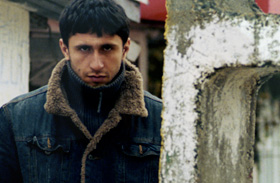If Romania has a drop off in police service enrollment, they’ll be blaming Corneliu Porumboiu’s second feature film. His previous, equally genius debut 12:08 of Bucharest, was perhaps more aplomb with its commentary on the phasing out of communist life in Romania, but this Cannes winner makes a more poignant argument about the remnants and the ramifications of state control system by almost concealing it in this non-pertinent plot of a undercover sting operation targeting a lone, teen pothead. Patterned with minimalist surroundings, low-key performances and long takes that are filmed in real time, the almost mute Police, Adjective cleverly details how Romanian society has not entirely deposed of, or moved away from its past with this anti-thesis of a Michael Mann film.
Drago Bucur plays a plain-clothes policeman working a tediously uneventful stake-out shifts in his village of Vaslui. When his character figures out that the bread crumbs (or butted out joints) he’s been following don’t lead to much, he exercises more caution than what would have been expected from a person in his position in the not so distant past. Not wanting to damage a teenager’s future by throwing the book at him, after making the big reveal to his superiors that there is nothing to this case, Porumboiu’s screenplay which until this point reveals itself as the most undramatic, inactive police story ever, slowly charts a more cerebral territory.
This notion of everyone’s hands “being tiedâ€, is further visually elaborated when Bucur’s Christi is witnessed waiting this interminable wait in the secretary’s office with Porumboiu matching this by going the full ten with the film’s run time. Such sequences clash wonderfully when he is off-duty, at home, using his down time to not necessarily challenge the system but to challenge word spelling and get into existential questions of the what would toothpaste be without a toothbrush type, which are playfully thought up of during dinner time. Moments where we see husband and wife debate the relevance on an outdated pop song beautifully prep the viewer for the film’s final leg. Set in the unmodernized police headquarters, not a case of insubordination in the true sense of the meaning, the officer questions the status quo by challenging the law and police procedure with a discussion on the origin and the meaning of words. Diligently played by Vlad Ivanov, the Captain entertains this discussion, providing the film with a self-serving punchline which jives especially well after holding the viewer hostage to excruciatingly long sequences.
The Cannes’ Un Certain Regard selection demands the kind of patience required for a Ming-Ling or Hsiao Hsien film, but here the payoff comes awfully close to the comic timing of a Aki Kaurismaki or Roy Andersson. Void of wild police car chases or crazy drug busts, if you’re willing to accept that the bait of the film are the branded punch-lines which are delivered when intended, and in the most un-dramatic fashion possible, then you’ll witness precisely why Porumboiu should be considered this early in his career, as a film making guru for his full use of film language.
Reviewed at the 2009 Cannes Film Festival. Un Certain Regard Section.
110 Mins. May, 16th, 2009
